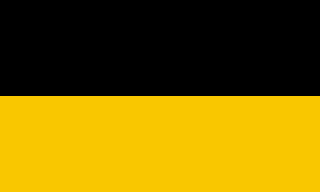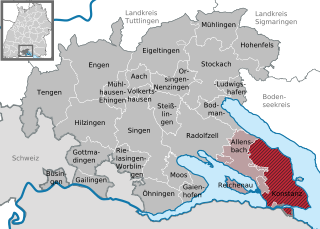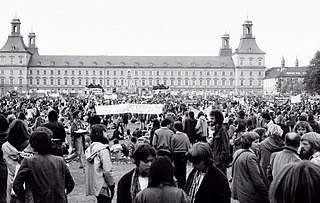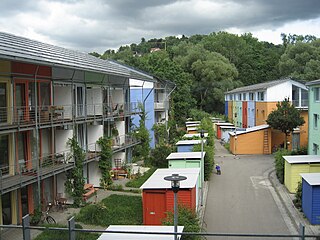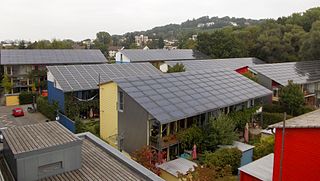This biography of a living person needs additional citations for verification .(December 2012) (Learn how and when to remove this template message) |
Rolf Disch | |
|---|---|
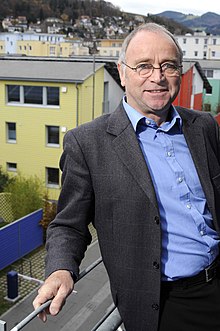 | |
| Born | 1944 |
| Nationality | German |
| Alma mater | Structural Engineering School Freiburg, University of Applied Sciences Konstanz, Guest Professor National School of Design Karlsruhe |
| Occupation | Architect |
| Awards | 1997 Eco-manager of the Year 2002 European Solar Prize 2003 Global Energy Award 2006 Germany's most beautiful housing community 2008 German Sustainability Award |
| Practice | Rolf Disch Solar Architecture |
| Buildings | Heliotrope PlusEnergy Sun Ship |
| Projects | Solar Settlement |
Rolf Disch is a German architect, solar energy pioneer and environmental activist. Born in Freiburg im Breisgau, Germany, Disch has dedicated particular focus to regional renewable and sustainable energy.

Solar energy is radiant light and heat from the Sun that is harnessed using a range of ever-evolving technologies such as solar heating, photovoltaics, solar thermal energy, solar architecture, molten salt power plants and artificial photosynthesis.

Freiburg im Breisgau is a city in Baden-Württemberg, Germany, with a population of about 220,000. In the south-west of the country, it straddles the Dreisam river, at the foot of the Schlossberg. Historically, the city has acted as the hub of the Breisgau region on the western edge of the Black Forest in the Upper Rhine Plain. A famous old German university town, and archiepiscopal seat, Freiburg was incorporated in the early twelfth century and developed into a major commercial, intellectual, and ecclesiastical center of the upper Rhine region. The city is known for its medieval minster and Renaissance university, as well as for its high standard of living and advanced environmental practices. The city is situated in the heart of the major Baden wine-growing region and serves as the primary tourist entry point to the scenic beauty of the Black Forest. According to meteorological statistics, the city is the sunniest and warmest in Germany, and held the all-time German temperature record of 40.2 °C (104.4 °F) from 2003 to 2015.

Germany, officially the Federal Republic of Germany, is a country in Central and Western Europe, lying between the Baltic and North Seas to the north, and the Alps to the south. It borders Denmark to the north, Poland and the Czech Republic to the east, Austria and Switzerland to the south, France to the southwest, and Luxembourg, Belgium and the Netherlands to the west.
Contents
- Biography
- Early years
- Activism
- Built with the Sun
- Awards
- Selected works
- See also
- References
- External links
As head of his own architecture firm, Rolf Disch Solar Architecture, Disch is committed to advance Germany's usage of solar energy in respect to residential, retail and commercial building and design. In 1994, Rolf Disch built the Heliotrope in Freiburg which was the world’s first home to create more energy than it uses, as it physically rotates with the sun to maximize its solar intake. Disch then developed the concept PlusEnergy, simply making it a permanent goal for his buildings to produce more energy than they consume in order to sell the surplus solar energy back into the grid for profit.

Rolf Disch Solar Architecture, creators of the Heliotrope as well as several other visionary green building projects, is based in the solar city Freiburg, Germany. Led by solar pioneer Rolf Disch, who has been building with the sun for more than 40 years, this architecture office's prolific portfolio also includes such successful projects as the Solar Settlement and the Sun Ship. As winners of the 2002 European Solar Prize and the 2003 Global Energy Award these projects demonstrate the power of solar architecture; harness the sun both passively and actively. Lying at the base of the Black Forest, in the sunniest city in Germany, Rolf Disch Solar Architecture offers a premium design that exceeds the highest ecological standards while creating profitable opportunities for their investors.
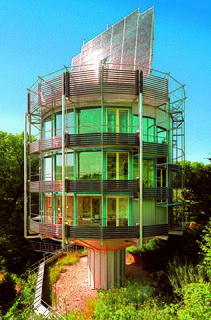
The Heliotrope is an environmentally friendly house designed by the German architect Rolf Disch who also designed the Sonnenschiff (Sun Ship). Three such houses exist in Germany, the first experimental version having been built in 1994 as the architect's home in Freiburg im Breisgau, while the other two are used as exhibition buildings for the Hansgrohe company in Offenburg and a dentist's lab in Hilpoltstein in Bavaria. The Heliotrope in Freiburg was the first building in the world to capture more energy than it uses, all of which is entirely renewable, emissions free and CO2 neutral. The structure physically rotates to track the sun, which allows it to harness the maximum natural sunlight and warmth possible. Several different energy generation modules are used in the building including a 603 sq ft (56.0 m2) dual-axis solar photovoltaic tracking panel, a geothermal heat exchanger, a combined heat and power unit (CHP) and solar-thermal balcony railings to provide heat and warm water. These innovations in combination with the superior insulation of the residence allow the Heliotrope to capture anywhere between four and six times its energy usage depending on the time of year. The Heliotrope is also fitted with a grey-water cleansing system and built-in natural waste composting.

PlusEnergy is a term used in building design to describe a structure that produces more energy than it uses. The term was coined in 1994 by Rolf Disch when building his private residence, the Heliotrope as the first PlusEnergy house in the world. Disch then went on to refine the concepts involved with several more projects built by his company Rolf Disch Solar Architecture in order to promote PlusEnergy for wider adoption in residential, commercial and retail spaces. Disch maintains that PlusEnergy is more than just a method of producing environmentally-friendly housing, but also an integrated ecological and architectural concept. As such, PlusEnergy is intended to be superior to low-energy or zero-energy designs such as those of Passivhaus.
Rolf Disch’s biggest venture was completed in 2004 with the 59 PlusEnergy home Solar Settlement and the 60,000 sq ft (5,600 m2). PlusEnergy Sun Ship. In June 2009, Disch launched the 100% GmbH organization, with the aim to make Freiburg and its surrounding district the first 100% sustainable renewable energy region in the world.

The Sun Ship is a large integrated office/retail building designed by architect Rolf Disch and located in Freiburg directly next to the Solar Settlement by the same designer. It uses 60,000 sq. ft. for retail, commercial and residential space.

Renewable energy is energy that is collected from renewable resources, which are naturally replenished on a human timescale, such as sunlight, wind, rain, tides, waves, and geothermal heat. Renewable energy often provides energy in four important areas: electricity generation, air and water heating/cooling, transportation, and rural (off-grid) energy services.
